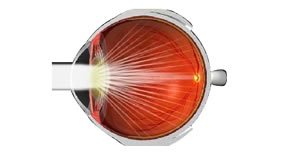CATARACT SURGERY
Huge medical advances have been made in the treatment of cataracts. Cataract surgery is generally a relatively simple outpatient procedure with little discomfort, requiring only a few hours and a topical anesthetic.
Depending on the severity of your vision loss, you may be able to delay surgery for a while, but eventually, surgery may be inevitable as lenses and glasses do not actually treat the cataract.
When your cataract progresses to the point that daily tasks become difficult, you need surgery to reduce impact on daily activities and safety.
What are cataracts ?
A cataract is the clouding of the lens due, it happens because different causes such as: age, trauma, congenital, systemic disease, causing progressive loss of vision in the patient.
The vision becomes darker and the colors are less bright, under the clouding of the lens, which is the natural lens of the eye, giving a feeling that prevents the formation of sharp images through the retina.
The diagnosis is made by the eye doctor through a series of medical treatment. Don’t exist a cataract treatment to eliminate it, surgery is the most effective one.
What to Expect During Cataract Surgery?
Recent advancements in cataract surgical techniques make general anesthesia unnecessary. The nurse will apply a topical anesthetic that will numb and immobilize your eye, but you will remain awake and alert the entire time.
- After you have been given numbing drops for your eye, you will be able to hear the sounds of the instruments and your doctor, nurse, and technician talking, but you probably won't be able to see them.
VISION with Cataracts

- A drape will be placed around your face so that only the eye to be operated on is visible. The doctor will then make a very small incision in the cornea and insert a small probe, about the size of a pen tip. This instrument breaks the cloudy lens into pieces and removes them from the eye. Once the cataract is removed, a replacement lens is inserted through the same tiny incision and set into position to replace the natural lens. In most cases, the incision is so small that stitches are not required to close it.
- Most people experience no pain or discomfort during the procedure, which lasts anywhere from 15 to 30 minutes. During this time, most patients are aware of the surgical team and environment around them, but they can't make out any images.
- Once the cataract surgery is complete, your doctor will cover your eye with a shield. After a short recovery period, you can have someone drive you home.
-
After Cataract Surgery
While each person's experience will be unique, here are a few things that most people experience following cataract surgery.
- You may also be provided an eye patch to wear for a few days, to keep away irritants.
- You may receive prescription medications and instructions on how to care for your eye. Your follow-up appointment(s) will be scheduled, and then you will go home. Your doctor may give you dark sunglasses for the drive.
- Relax and let your caregiver fill and deliver your prescriptions. You will not be allowed to drive yourself.
- Avoid touching or rubbing your eye or removing the protective covering. Your eye may feel sensitive, even scratchy, for a few days. You may even see a little glare or halos, but this will go away over time.
- Wear your protective eye covering while you sleep, if advised, and try to avoid sleeping on the side of your body that has been operated on.

